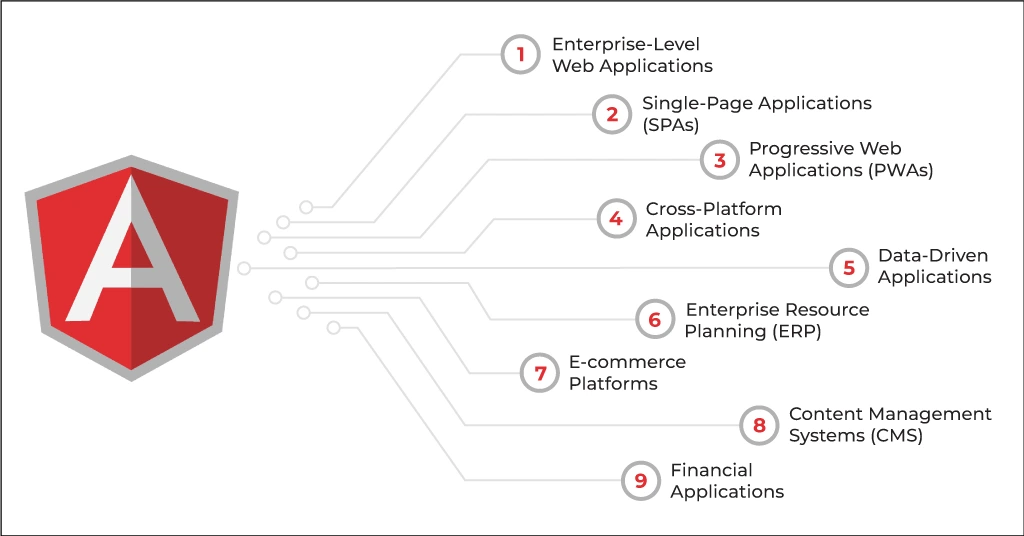Angular is a popular front-end (or client-side) technology that has empowered many applications, particularly Business-Critical Applications!
When it comes to technologies like Angular, there is something important you should know…
While they are all powerful and capable of meeting your needs, what makes one technology more suitable than another is the specific expectations your business has for any application.
When choosing a technology for the front end, people often suggest either Angular or React.
But which one should you choose?
Both are successful and capable technologies, but the types of applications they are best suited for differ.
So, it’s important to have a basic understanding of the subject or to find relevant information online, right?
To provide that quick insight, we’ve written this blog to help clear things up for you before creating angular applications, as it’s impossible to cover everything here!
So, let’s begin—but first, let’s get to know the strengths & weaknesses of Angular as a front-end technology.
Advantages and Disadvantages of Angular Framework
Pros of Angular
1. Component-Based Architecture
Angular uses a component-based architecture, which means the application is built using reusable components. This makes the code easier to manage, test, and scale, especially in large applications.
2. Two-Way Data Binding
One of Angular’s standout features is two-way data binding. This means that any changes made in the user interface (UI) automatically update the corresponding model (data) and vice versa. It simplifies development because you don’t need to manually keep the UI and the data in sync.
3. Built-In Features
Angular comes with a lot of built-in features, like form validation, HTTP client for making requests, routing for navigation, and dependency injection for managing services. This reduces the need for third-party libraries and provides a more consistent development experience.
4. TypeScript Integration
Angular is built with TypeScript, a superset of JavaScript that adds static typing. This helps catch errors early during development and provides better tooling support, like autocompletion and navigation.
5. Robust Ecosystem and Community Support
Being maintained by Google, Angular has strong community support and a large ecosystem of tools, libraries, and extensions. This makes finding solutions, resources, or hiring talent much easier.
6. High Performance
Angular’s framework is designed to optimize performance with features like Ahead-of-Time (AOT) compilation, which compiles your code before the browser loads it, resulting in faster page loads and better overall performance.
7. Scalability
Angular is highly scalable, making it an excellent choice for enterprise-level applications. Its modular architecture and structured code make it easier to manage and expand applications over time.
Cons of Angular
1. Steep Learning Curve
Angular has a steep learning curve, especially for beginners or developers new to modern JavaScript frameworks. It has many concepts, such as modules, decorators, dependency injection, and RxJS for handling asynchronous operations, which can be overwhelming.
2. Verbose and Complex Code
The code in Angular can sometimes be verbose and complex compared to other frameworks like React or Vue. It often requires writing more boilerplate code to get things done, which can slow down development, especially for smaller projects.
3. Performance Overhead for Simple Applications
For small or simple applications, Angular might feel like overkill. Its heavy framework can introduce unnecessary complexity and performance overhead, whereas a lighter solution might be more efficient.
4. Frequent Updates and Breaking Changes
Angular is frequently updated, which can be a double-edged sword. While updates bring new features and improvements, they can also introduce breaking changes that require significant refactoring, especially for long-term projects.
5. Limited SEO Capabilities
Out of the box, Angular applications can have limited Search Engine Optimization (SEO) capabilities because they are typically single-page applications (SPAs) that rely heavily on JavaScript.
However, using Angular Universal (for server-side rendering) can help mitigate this issue, but it adds extra complexity to the development process.
Now let’s get to know the list of various applications that are best developed using Angular.
Types of Applications that are better built with Angular
If you’re considering Angular for your next project, you might be wondering what types of applications are best suited for this popular front-end framework.
Here are some of them listed along with the benefits of angular and reasons why using angular can be the right choice.

1. Enterprise-Level Web Applications
Enterprise-level applications are large-scale systems designed to support the operations of an entire organisation.
These applications require complex and interactive user interfaces to manage advanced features such as user management, real-time data updates, and intricate workflows.
Why use Angular?
- Angular’s component-based architecture allows for building sophisticated, modular UIs, making it easy to create and manage complex interfaces.
- Its modular design ensures scalability and maintainability, allowing developers to easily update and expand the application as business needs change.
- This is crucial for enterprise applications that need to remain adaptable over time.
2. Single-Page Applications (SPAs)
Single-page applications (SPAs) are web applications that load a single HTML page and dynamically update content as users interact with the app, creating a seamless user experience.
Why use Angular?
- Angular was designed with SPAs in mind.
- Its features, such as data binding, routing, and dependency injection, provide a smooth, responsive experience like a desktop application.
- With Angular, developers can build dynamic SPAs that load data quickly and offer seamless interactions without constant page reloads, which enhances the overall user experience.
3. Progressive Web Applications (PWAs)
Progressive Web Applications (PWAs) combine the best aspects of web and mobile apps, offering an app-like experience within a web browser. Big brands like Flipkart and Trivago are leveraging the tech for a better user experience.
Find more reasons why you should convert your website to PWAs.
And if you are considering PWA development, here is why you should prefer Angular as your technology choice.
Why use Angular?
- Angular’s support for service workers and offline capabilities makes it an ideal choice for developing PWAs.
- These applications can function offline, send push notifications, and provide a native-like user experience across various devices, making them reliable, fast, and engaging.
- Angular’s built-in features allow developers to create PWAs that feel like native mobile apps while benefiting from the broad reach of the web.
4. Cross-Platform Applications
Cross-platform applications are designed to run on multiple platforms, such as iOS and Android, from a single codebase.
Why use Angular?
- With tools like Ionic and NativeScript, Angular allows developers to build cross-platform mobile applications that deliver a consistent user experience across different devices.
- This approach reduces development time and costs, making it particularly beneficial for businesses looking to reach a broader audience without the overhead of maintaining separate codebases for each platform.
5. Data-Driven Applications
Data-driven applications, such as dashboards, analytical tools, or real-time applications, rely heavily on dynamic data handling and real-time updates.
Why use Angular?
- Angular’s strong data binding and component-based structure make it ideal for applications that require real-time data updates and interactions.
- It supports the creation of dynamic views that automatically update when the underlying data changes.
- Additionally, Angular’s robust support for forms, HTTP requests, and state management enhances its suitability for handling complex data-driven tasks efficiently.
6. Enterprise Resource Planning (ERP) Systems
ERP systems are complex software platforms used to manage and integrate various business processes, including HR, finance, and inventory.
Why use Angular?
- Angular’s architecture is well-suited for building modular and maintainable ERP systems.
- It can manage complex workflows and handle vast amounts of data while providing a unified interface for multiple modules.
- Angular’s ability to integrate seamlessly with backend services and manage large-scale, data-intensive operations makes it a strong candidate for ERP development.
7. E-commerce Platforms
E-commerce platforms need to provide a smooth shopping experience with dynamic product catalogues, user management, real-time updates, and secure transactions.
Why use Angular?
- Angular’s two-way data binding and reactive forms make it ideal for developing robust e-commerce sites.
- It supports features like dynamic product filtering, shopping cart management, and secure checkout processes, ensuring a seamless shopping experience that keeps users engaged and satisfied.
8. Content Management Systems (CMS)
Content Management Systems (CMS) require a flexible, dynamic front-end to manage various content types and user interactions effectively.
Why use Angular?
- Angular’s component-based architecture allows for the creation of reusable components, which is highly beneficial for CMS platforms.
- These components facilitate efficient content editing, publishing, and version control, making Angular a great choice for building scalable and manageable CMS solutions.
9. Financial Applications
Financial applications need to handle high-security requirements, real-time data processing, and complex calculations, such as those used in trading platforms or investment management tools.
Why use Angular?
- Angular’s capabilities for building secure, scalable, and interactive user interfaces make it suitable for financial applications.
- Its robust architecture supports complex financial calculations and real-time data updates, ensuring high reliability and performance, which is crucial for applications dealing with sensitive financial information.
Something Important to Note!
While we’ve listed the types of applications that can be developed using Angular, it’s essential to consider other factors for successful application development.
These factors include the right combination of backend and frontend technologies, the application’s architecture, and both current and future needs.
Don’t make the mistake of choosing a technology for your application at random.
Always consult with experts, share your specific needs, and discuss your expectations for the application.
This will help ensure that you make the best choice for your project!
Otherwise, – For any of your development requirements matching the above, angular can be a great choice of technology!
Thinking to Develop Your Business Application in Angular?
You’ll need skilled Angular developers to bring your vision to life!
At Covrize, our team has experience creating Angular apps and knows inside-out of the tech, to build powerful solutions tailored to your business.
Whether you’re in finance, retail, or any other industry, we’ve got the expertise to bring your ideas to life.
Ready to get started?
Drop us your requirements, and we’ll show you how we can make it happen!







